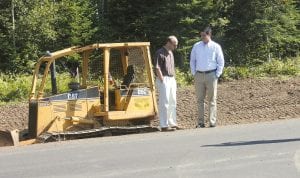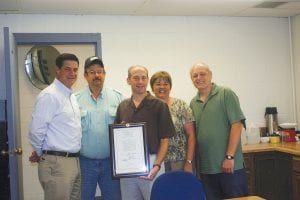U.S. Representative Chip Cravaack (right), visited Grand Marais on Friday, August 10, hand-delivering a copy of the legislation that paved the way for completion of the County Road 8 roadwork. In addition to visiting with Cook County Highway Department staff at the shop, Cravaack checked out the road project with County Engineer David Betts.

With the primary election just a few days away, U.S. Representative Chip Cravaack visited Cook County on August 10, hand-delivering a copy of the bill that finally cleared the way for reconstruction of a portion of County Road 8 (Devil Track Road) to Cook County Engineer David Betts.
Plans for reconstruction of County Road 8 have been in the works for quite some time. The first phase—reconstruction of 2.4 miles—was completed this spring, but the second phase—1½ miles—was in limbo as the county worked to obtain right-of-way for an area 1,320 feet long and 100 feet wide from the federal government. That is where Representative Cravaack came to the county’s aid.
At a meeting with constituents shortly after he was elected, Cravaack heard about the hold-up from County Engineer David Betts. According to Betts, County Road 8 was relocated in the 1950s. At that time, the deed to the land it crossed was transferred from the federal government to the state and then to the county to be part of the Cook County Airport. The deed language stated that if the land was not used for an airport, it would revert back to federal ownership. An act of Congress was needed in order for the county-owned airport to transfer the land needed for road reconstruction to the county instead of back to the federal government.

U.S. Representative Chip Cravaack visited the Cook County Highway Department on Friday, August 10 to deliver a copy of the bill, signed by President Barack Obama on June 8, 2012, that allows the highway department to purchase land from the Cook County Airport for County Road 8 reconstruction. Visiting at the county highway garage were (L-R) Representative Cravaack, Highway Department Maintenance Supervisor Russell Klegstad, County Engineer David Betts, and Commissioners Sue Hakes and Bruce Martinson.
The right-of-way was not free. The Federal Aviation Administration (FAA) required the county to purchase the land from the airport and that the airport place those funds in reserve for airport improvements. The price tag was approximately $160,000, which the Cook County Highway Department had budgeted for but could not spend until the right-of-way issue was resolved.
Cravaack introduced H.R. 2947 in September 2011 and worked with Senators Amy Klobuchar and Al Franken to create a companion bill in the U.S. Senate. H.R. 2947 directed the Secretary of Agriculture to release Minnesota from the federal restrictions on how the land could be developed. The House and Senate bills passed and went to President Barack Obama, who signed the special bill for Cook County on June 8, 2012.
As Cravaack presented County Engineer Betts with a “red-line copy” of the bill, approved and signed by the President, he said, “This common-sense bill remedies the unintentional consequence of restrictive language in the original deed. Cook County has finally been able to purchase the right-of-way and move ahead with the necessary reconstruction. This will greatly benefit the residents and visitors of Cook County by allowing the highway department to improve the safety and ride quality of this roadway.”
Cook County Commissioners Bruce Martinson and Sue Hakes were at the county highway department building to witness the presentation. Commissioner Martinson said, “On behalf of the county board, we really appreciate your carrying the ball to allow us to complete the County Road 8 project.”
Other issues discussed
After presenting the framed legislation, Representative Cravaack and staff drove up the Gunflint Trail to County Road 8 to see the road construction under way. But not before visiting with the commissioners and other citizens.
Commissioner Martinson made an appeal to Cravaack for assistance in re-opening the loading docks at Taconite Harbor. Cravaack said this is something that he would like to see happen. He noted that the taconite industry has very high electrical use, so the Minnesota Power Taconite Energy Center is very important to the region. He said he understood concerns such as “fugitive dust” but he said the power plants are working to overcome this and other issues. He said his staff is working to see that the Environmental Protection Agency (EPA) also considers the economic impact of its actions on communities. “We all want to take care of our water and our land,” said Cravaack, “but let’s use some common sense on this.”
The possible exchange of school trust lands inside the Boundary Waters Canoe Area Wilderness for federal land outside the BWCAW boundaries was also discussed, with Commissioner Martinson noting that this was a “30-year problem that should have been dealt with years ago.” Highway Department Maintenance Supervisor Russell Klegstad expressed concern that the true value of the land within the BWCAW was not being calculated because no soil testing can be done in the wilderness. Klegstad said land with good gravel and/or minerals should be assessed at a higher rate. Commissioner Hakes also pointed out that the county was trading “a lot of lake shore.”
Klegstad noted that the U.S. Forest Service said the value of the land is low because it can’t be developed—but the reason the land can’t be developed is because the Forest Service won’t allow it. “It’s an unfair situation,” said Klegstad.
Cravaack said he is working to pass the Minnesota Education Investment and Employment Act to ensure that the potential BWCAW land swap is fair. He said any school trust land exchange must incorporate both surface and subsurface lands. Cravaack said, “Our schools need money. Our schools deserve a revenue stream from mining, timber sales and leasing from these newly exchanged school lands.”
Asked if he was doing anything different in the days leading up to the primary election, Cravaack said no. “I’m doing my job. I answer to the people of the 8th District,” he said, adding that Minnesota’s 8th Congressional District is the second largest district east of the Mississippi and is bigger than 11 states.


Loading Comments